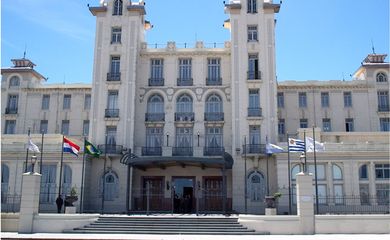On Mercosur’s 30th anniversary, Bolsonaro advocates modernization

President Jair Bolsonaro on Friday (Mar. 26) advocated the modernization of Mercosur, with the update of the Common External Tariff (CET) as crucial to the reinvigorating the bloc. Also on Friday, Bolsonaro participated in an online meeting celebrating the 30th anniversary to Mercosur’s summit.

“We have consolidated political regimes based on direct elections and the people’s sovereignty. Commercial openness has multiplied the exchange between our countries. There has been growth, as well as gains in the well-being of our peoples. However, the bloc is clearly in need of restoring its relevant participation in commercial and economic flows between member states,” Bolsonaro declared.
The CET is a group of tariffs charged on the import of goods and services of companies of the bloc’s country members and is based on the Common Mercosur Nomenclature for products and services. Its goal is to stimulate competitiveness among bloc nations. The tariff is structured as 11 rate levels going from zero to 20 percent, rising the more added value a given good has.
Since 2019, the revision of the CET has been debated more and more often. Bolsonaro mentioned the meeting slated to take place next week, when Mercosur ministers will gather to discuss the topic and the agenda as well as modalities of the bloc’s external talks.
There is room for deepening regional ties among nations, starting with the reduction of non-tariff barriers and the incorporation of sectors not yet integrated with trade within the bloc, Bolsonaro believes. “We want to enhance the rules valuing the business environment. We must address the gaps in the auto and sugar sectors and align current norms to the best practices and international standards,” he went on to say.
External agreements
The president also argued for the expansion of external talks, so that bloc countries can join “the fourth industrial revolution” and occupy “the space in the world befitting major international economic currents.”
“We want speed and significant results. We have focused on efforts on attracting external investment and generating employment and income. We wish our economies to participate more and more in the new regional a global value chains, especially at the present moment, when we need to urgently tackle the damages caused by the pandemic,” he completed.
According to the president, in order to implement Mercosur’s modernization agenda, there must be “commitment and a cooperation spirit among its members.” “Any differences in perspectives among us—political or economic in nature—must not impact the progress of the integration project, provided that the principles on which the bloc are based are respected. We understand that the consensus rule cannot be turned into a permanent veto or brake tool. The flexibility principle is written in the Treaty of Asunción itself,” the Brazilian president declared.
The Treaty of Asunción, instituting Mercosur, was signed on March 26, 1991, in Asunción, Paraguay.
The bloc is formed by Argentina, Brazil, Paraguay, and Uruguay, plus associated countries. In its 30 years of existence, Mercosur has brought positive results for the country. From 2011 to 2020, Brazil exported $54.9 billion more than it imported from other countries in the group, with a diversified exports agenda, both in industrial goods and foods. In this time span, the commercial surplus is second only China, to which Brazil exported $158.3 billion more than it imported, but sales to the Asian countries are focused on few products.
Internationally, Mercosur sells 63 percent of the world’s soybeans, and is the top exporter of beef and chicken, chicken, coffee, and iron, as well as the globe’s eighth biggest car producer. The bloc’s total GDP reached $4.467 trillion in 2019 (as gauged by pairing with purchasing power), which places it as the fifth biggest economy on the planet.
The Friday Meeting was broadcast in full on the Argentinian government’s YouTube channel. The country is currently serving as the bloc’s pro tempore president. In attendance were the president of Argentina, Alberto Fernández, Paraguay’s Mario Abdo Benítez, and Uruguay’s Luis Alberto Lacalle Pou, joined by the presidents of Bolivia, Luis Arce, and of Chile, Sebastián Piñera, as representatives of associated nations.
During the meeting, Argentinian Chancellor Felipe Solá presented Mercosur’s Citizen Statute. The document comes as a result of a ten-year plan proposed by country members in 2010, in line with the strategy of adopting a multidimensional focus on integration, in favor of sustainable development with justice and social inclusion.
The document includes rights and benefits directly impacting the lives of residents from Mercosur member countries in such topics as circulation of people, housing, borders, labor, social security, education, consular cooperation, communications, and consumer’s defense. The statute discusses all ten topics making up a transversal perspective of human rights, equality and non-discrimination.
Also laid out are questions such as the possibility for a citizen in a Mercosur country to live in another bloc country and have access to formal employment in a simplified manner, studying and enjoying the same rights and liberties as the country’s nationals; and the right to request recognition for a primary or secondary degree with the same validity as in the country of origin.
During the broadcast on Friday, the president was accompanied by Foreign Minister Ernesto Araújo and Economy Minister Paulo Guedes.



